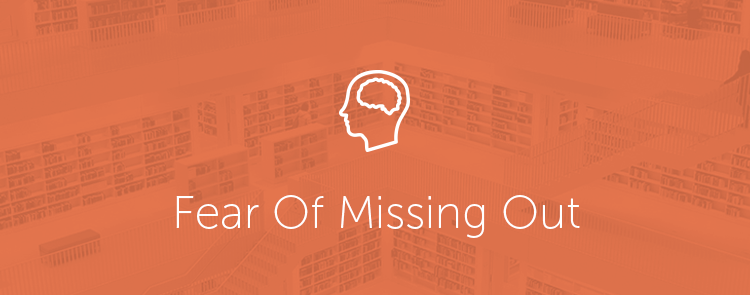Here’s a question for you…
Do you have FOMO?
You know, that feeling that you’re missing some fun somewhere? That any event you aren’t at is the best time ever? That someone’s Instagram feed is way more exciting than yours?
Wait, before you even answer, chances are you have experienced it from time to time.
It’s the “Fear of Missing Out.” The term is relatively new (it was only officially added to the Oxford English Dictionary in 2013).
And while the advent and explosion of social media has played a direct role in naming this specific type of social anxiety, the feelings actually associated with it have been around for a very long time.
FOMO and Marketers
Now, what’s really interesting about FOMO is that it can play a huge role in marketing, especially reveal marketing. In fact, fear of missing out is one of the six major psychological factors that we feel reveal marketing taps, and compels consumers to engage and act.
First, let’s look at it from a straight marketing perspective. What is it that marketers really want? More customers, more email opens, more clicks on ads…sound familiar?
In order to do that, readers and customers need to be compelled to take action. Unfortunately, with most marketing, more ads, and more spam, that’s just not happening quite as much as it used to.
So what to do?
Embrace FOMO.
Look at this ad from retailer RuLaLa:
With this simple email RuLaLa is calling fear of missing out directly (literally, they make FOMO the premise of the campaign).
“Hey, if you don’t click on this email, you’re going to miss out!” By appealing to that fear, they got more clicks, even from some people who probably weren’t all that interested to start.
And check out this from Amazon:
Amazon takes a different approach, but it’s no less effective. These daily “lightening deals” go right to the heart of the psychology of their customers. It ticks down a timer, and creates a sense of urgency.
Chances are, the few people out there who happened to need a garlic press were far more likely to buy because that 90% claimed number coupled with the countdown clock, spoke directly to their fear of missing out.
Both of these companies are using tactics that speak directly to the fear of missing out, but in different ways.
Smart, right?
Winning the Lottery…or Not
One of the biggest examples of FOMO that most people get swept up in is the lottery.
Think about it, even if you aren’t a regular lotto fan, once you hear the jackpot is up to $345 million dollars, you start thinking that it might not be a bad idea to buy a ticket. The odds of you actually winning are tiny, but the fear of missing out on the chance to be a millionaire is stronger.
This ties in with the Near Miss Theory as well. This theory, studied by R.L. Reid, follows that almost winning at something makes the desire for a person to engage even stronger for the next time.
In episode 2 of NPR’s Hidden Brain, the conversation on the first half of the podcast centers around this idea. It really joins together just how powerful the psychological pull of both fear of missing out and the near miss theory is.
Marketers need to be taking note.
In reveal marketing, we’ve been able to combine FOMO and Near Miss Theory to dramatically improve the active engagement and interaction among users.
Developing campaigns that allow readers and potential customers the chance to win, while also tapping into the feeling that if they don’t engage they will be missing out, can be a very powerful (and winning) combination for marketers.


